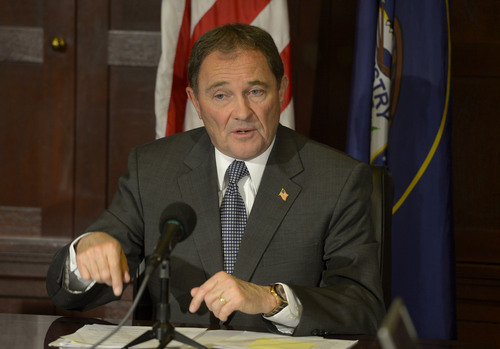This is an archived article that was published on sltrib.com in 2014, and information in the article may be outdated. It is provided only for personal research purposes and may not be reprinted.
Gov. Gary Herbert said Thursday that he is disappointed in governors and attorneys general in states like Pennsylvania and Oregon who choose not to defend their state's same-sex marriage bans, calling that "the next step toward anarchy."
"My job is to represent the people of Utah and follow the law on the books," Herbert said during his monthly KUED news conference. "It's very clear to me. I've sworn allegiance to the Constitution of Utah and the Constitution of the United States."
Utah's governor should not "pick and choose" which laws he will enforce and neither should elected officials in other states, Herbert said.
"I find it very disappointing," he said of decisions by officials to not defend their states' same-sex marriage bans. "Voices here in our community, media and others, ought to, in fact, call them on the carpet and say, 'You have a responsibility to defend the law that's been put on the books by the people.'
"For elected officials, governors and attorneys general, to say pick and choose which laws they will enforce," he added, "I think, is a tragedy and the next step toward anarchy."
Herbert reiterated his belief that Utah has the right to define marriage as it sees fit, as states have done for generations. But, he said, the final answer to the issue won't be resolved until the challenges to the law in Utah and other states go to the U.S. Supreme Court.
In recent months, various federal judges have knocked down same-sex marriage bans in numerous states. Same-sex marriage is now legal in 19 states and the District of Columbia, although marriages are on hold in Utah and other states pending appeals.
Clifford Rosky, a law professor at the University of Utah and board member for Equality Utah, said the governor is wrong in his analysis.
As Herbert notes, Rosky said, he swore to uphold both the Utah Constitution and the U.S. Constitution, which is the supreme law of the land, and therefore must decide if any state law violates the U.S. Constitution.
"I understand that the governor and attorney general think that [Utah's] Amendment 3 [banning same-sex marriage] is constitutional, but there is increasing evidence across the United States that their view is incorrect," Rosky said. "Every single judge in the country who has been asked the question in the past year has held that state laws against same-sex marriage are unconstitutional and that everyone has the right to marry in this country."
Herbert praised U.S. District Judge Dale Kimball for issuing a stay on a recent ruling that ordered Utah to honor the marriages of more than 1,000 same-sex couples that took place after U.S. District Judge Robert Shelby struck down the state's law Dec. 20 and before the Supreme Court halted further marriages pending an appeal.
Kimball gave the state 21 days to respond to his decision, which Herbert said recognizes the ramifications of such an order. He said he plans to meet with Attorney General Sean Reyes soon and discuss how the state will proceed.
Judges in several cases have likened the ban on same-sex marriages to states that banned interracial marriage, which were deemed unconstitutional.
Herbert differentiated between those, initially, saying people choose their sexual orientation.
"What you choose to do with your sexual orientation is different than what you're born with as your race," Herbert said.
When pressed on the issue, Herbert backed away from that assertion, saying he didn't know if people are born gay.
"I think it's unclear. I expect there may be different gradations," he said. "Clearly the actions involved in sexual activity ultimately end up being choices. What your attraction may be is something else, but how you act upon those impulses is a choice. But that's not for me to make that decision."
Twitter: @RobertGehrke



